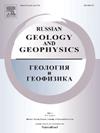北高加索中部的地电模型:三维反演
IF 1
4区 地球科学
Q3 GEOSCIENCES, MULTIDISCIPLINARY
引用次数: 0
摘要
––在阻抗张量分量的一维和二维反演以及三维数学建模的基础上,对北高加索边缘地块、主山脉隆起和斯塔夫罗波尔拱门内的大地电磁数据进行解释,可以编译三维反演所需的启动和测试模型。在测试三维模型上进行的所有阻抗张量分量的三维反演表明,可以估计传导模型块的参数。考虑到在测试三维模型上获得的结果,对所有实验阻抗矩阵分量进行三维反演,显著校正了在一维和二维反演阶段识别的导电块的参数,以及北高加索中部大地电磁场的三维数学建模。在该区域的三维地电模型中,低电阻区块的位置与缝合带、深层断层、火山岩室和具有转换地震波的区域的位置相关,转换地震波速度降低,吸收增加。这可以用地壳块体的电导率对水饱和度的依赖性来解释。地震震源组在低阻异常附近。本文章由计算机程序翻译,如有差异,请以英文原文为准。
Geoelectric Model of the Central Part of the North Caucasus: Three-Dimensional Inversion
––Interpretation of magnetotelluric data within the North Caucasus marginal massif, the uplift of the Main Range, and the Stavropol Arch, performed on the basis of one- and two-dimensional inversions of the impedance tensor components and three-dimensional mathematical modeling, makes it possible to compile the starting and test models that are necessary for a three-dimensional inversion. It is shown by the three-dimensional inversion of all the impedance tensor components, carried out on a test three-dimensional model, that it is possible to estimate the parameters of conducting model blocks. The three-dimensional inversion of all the experimental impedance matrix components, performed with account for the results obtained on the test three-dimensional model, significantly corrects the parameters of the conducting blocks identified at the stages of one- and two-dimensional inversions, as well as the three-dimensional mathematical modeling of magnetotelluric fields in the central part of the North Caucasus. In the resulting three-dimensional geoelectrical model of the region, the position of low-resistance blocks correlates with the location of suture zones, deep faults, volcanic chambers, and domains with converted earthquake waves, whose velocities are reduced and whose absorption is increased. This can be explained by the dependence of the conductivity of crustal blocks on water saturation. Earthquake hypocenters are grouped near low-resistance anomalies.
求助全文
通过发布文献求助,成功后即可免费获取论文全文。
去求助
来源期刊

Russian Geology and Geophysics
地学-地球科学综合
CiteScore
2.00
自引率
18.20%
发文量
95
审稿时长
4-8 weeks
期刊介绍:
The journal publishes original reports of theoretical and methodological nature in the fields of geology, geophysics, and geochemistry, which contain data on composition and structure of the Earth''s crust and mantle, describes processes of formation and general regularities of commercial mineral occurrences, investigations on development and application of geological-geophysical methods for their revealing. As to works of regional nature, accelerated publication are available for original papers on a variety of problems of comparative geology taking into account specific character of Siberia, adjacent Asian countries and water areas. The journal will also publish reviews, critical articles, chronicle of the most important scientific events, and advertisements.
 求助内容:
求助内容: 应助结果提醒方式:
应助结果提醒方式:


